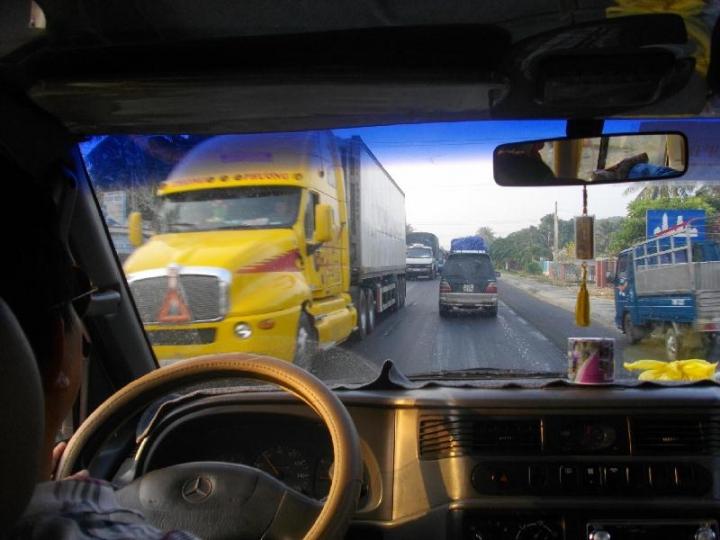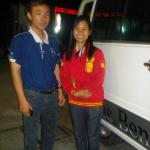|
Backpacking was a phenomenon that seems to have started in the seventies. It was young people
traveling through Asia with their kit on their backs and was mostly in India and Nepal as the world's
mentally lost rich kids tried to find Meaning at the feet of scruffy gurus and swamis in remote regions
of South Asia. I heard little more about the phenomenon until the nineties when I read travel articles
that mentioned the "backpackers" that were riding buses and hiking, still in India but also throughout
Southeast Asia
I met some of these romantic vagabonds on a ride from Ðà N?ng to Nha Trang in Vi?t Nam in
February. My host in Ðà N?ng, Ông Cu, had procured a ticket for the next leg of my journey from
Hà N?i back down to Cam Ð?c before I had even got to Ðà N?ng. I would have gone straight to
Nha Trang from Hà N?i but I had left my camera at Sr. Toàn's convent in Ðà N?ng and so had to
return there to retrieve the camera that had two weeks' of irreplaceable memories on it.
I like to think of myself as self-sufficient and able to get around in Vi?t Nam on my own but folks
don't let me do that. When they know I am bound somewhere I find that my tickets are taken care
of and I have accommodations with someone's friend's uncle when I get there so I don't have to stay
in a hotel. Ticket prices are also much cheaper when a local buys them than when the foreigner does
so I don't insist that I do it myself.
Ông Cu got me a ride on a fifteen passenger Mercedes van/bus that was operated by Huy?n Café, a
competitor to the hugely successful Sinh Café which has catered to the backpackers for years. The
ticket also would have been good all the way down to Cà Mau at the southern extreme of the country
but was right then the cheapest ride to Nha Trang. The passengers included two Finns, a Russian, a
Spanish lady, a Frenchman from Monaco, a newlywed Vietnamese rural couple, and a Hindu from Backpacking was a phenomenon that seems to have started in the seventies. It was young people
traveling through Asia with their kit on their backs and was mostly in India and Nepal as the world's
mentally lost rich kids tried to find Meaning at the feet of scruffy gurus and swamis in remote regions
of South Asia. I heard little more about the phenomenon until the nineties when I read travel articles
that mentioned the "backpackers" that were riding buses and hiking, still in India but also throughout
Southeast Asia
I met some of these romantic vagabonds on a ride from Ðà N?ng to Nha Trang in Vi?t Nam in
February. My host in Ðà N?ng, Ông Cu, had procured a ticket for the next leg of my journey from
Hà N?i back down to Cam Ð?c before I had even got to Ðà N?ng. I would have gone straight to
Nha Trang from Hà N?i but I had left my camera at Sr. Toàn's convent in Ðà N?ng and so had to
return there to retrieve the camera that had two weeks' of irreplaceable memories on it.
I like to think of myself as self-sufficient and able to get around in Vi?t Nam on my own but folks
don't let me do that. When they know I am bound somewhere I find that my tickets are taken care
of and I have accommodations with someone's friend's uncle when I get there so I don't have to stay
in a hotel. Ticket prices are also much cheaper when a local buys them than when the foreigner does
so I don't insist that I do it myself.
Ông Cu got me a ride on a fifteen passenger Mercedes van/bus that was operated by Huy?n Café, a
competitor to the hugely successful Sinh Café which has catered to the backpackers for years. The
ticket also would have been good all the way down to Cà Mau at the southern extreme of the country
but was right then the cheapest ride to Nha Trang. The passengers included two Finns, a Russian, a
Spanish lady, a Frenchman from Monaco, a newlywed Vietnamese rural couple, and a Hindu from
Mumbai. There were two drivers and me.Each rider was assigned a particular seat and window seats cost more than inside seats. As we were
boarding in Ðà N?ng The Spanish woman got into an argument, in English, with the agent about her
seat because she was given an inside seat (next to me in the front) and said she had paid for a window
and needed it to sleep. I really didn't care where I sat so I intervened in Vietnamese and told the driver
to put her in my window seat and I would sit on the inside seat. I said I had not chosen my seat and
and had not paid for my own ticket anyway. The swap was made, the lady got on and went right to
sleep against the window. The Vietnamese couple sat immediately behind me and the Hindu was
beside them.
The Hindu got my attention quickly. He was an arrogant johnny-come-lately to the backpacking scene
but proclaimed himself an expert on the subject. He said that he had been an officer in a bank that had
failed two years ago and had decided to go backpacking. He claimed to speak five languages and to
be wise in the ways of locals everywhere in Asia and spent the trip incessantly telling everyone how to
do it. He had been "backpacking" for less than a year and the others had been going on for a decade
or two. One thinks of backpackers as being young college kids taking a break from their studies by
wandering about Asia for a semester or a year but these folks were middle aged and had got stuck in
it. The Hindu was middle aged when he started. They had mostly dead eyes and didn't know anything
about the places they traveled or the people they met. Perhaps they did not really meet anyone at all,
they just passed by people and places and just kept moving unaware. Only the Spanish woman showed
any life in her eyes.
English is the lingua franca of the backpackers and I did not want to interact with the Hindu at all so I
resolved to speak no English on the trip. I spoke only with the newlyweds and to the driver. The Hindu
eventually decided I was faking- I didn't look like a Vi?t- and tried to engage me. I did not react to him
at all, not a muscle or an eye twitch to betray that I had understood anything he said. I expected him to
try Vietnamese with me since he had claimed to be fluent in it. It turns out that his fluency extended to a
limited tourists' vocabulary i.e. "Where is the bathroom?" and "I am hungry" and even that was toneless
in this highly tonal language.
The bus stopped at what in the U.S. would be a truck stop with a café and bathrooms and even a couple
of rentable-for-the-night rooms. The drivers chose a table and ordered coffee. I joined them and when the
newlyweds entered I called them over to our table. Th?y and Khanh just sat and did not order so I asked
them if they wanted something to eat. Th?y said unconvincingly that they were not hungry and I guessed
that they could not afford it. I asked them if they liked bún which seemed to be the specialty there and they
said they did so I ordered bún for them and coffee for them and for me. We all talked about the foreigners
and what I was about and I asked the couple about their own situation. They were from a village north of
Ða N?ng and were going to Nha Trang to "honeymoon" with an uncle's family near there. I asked them if
they would rather be in Ðà L?t, where all honeymooners want to go. They said yes but they really couldn't
afford that. Oh well.
When the drivers indicated it was time to reboard the bus I paid for the table. They said thanks and one
of them gave me a ticket good for going north. I didn't need it but was grateful and put it in my pocket. I
would give it to Thông along with the rest of my southbound one for his family's use in going back and
forth to Sài Gòn. Back on the bus the Hindu managed to trade seats so that he was on the other side of
me from the Spanish lady. On the road he started to get insistent that I must respond to him and made
insults and accusations of imposture. Again, I did not react at all. He made a production of passing
cookies across in front of me to the lady he called senorita (she was probably fifty years old) and
announcing that he understood everything I said but, of course, made no effort to speak Vietnamese
himself and showed no sign that he did understand. It all reinforced my determination to not let him hear
me speak any English or to give any sign that I understood it.
As we came into Nha Trang the Hindu told everyone where to find the best and cheapest hotels and the
best places to get food. He was quite wrong and had others followed his recommendations they would
have been out a lot of extra money. I turned to the Spanish lady and very quietly said in English, "Of course
you know the man is a fool."
She answered, also very quietly, "He would make us spend too much of money and avoid the people. I
know how to find a cheap hotel that is very good."
The season was still T?t, the Lunar New Year, and one custom in Vi?t Nam is Lì Xì, the giving of money
(25-50 cents if American) in brightly designed little red envelopes to children and to old folks. I still had
some envelopes in my pocket and put $50 dollars of Ð?ng in one. When we got off the bus at the Nha Trang stop and the end of the line for this bus,I gave it to
the Vietnamese couple and proclaimed it Lì Xì which was appropriate because they were newlyweds and I
said I hoped they could find a way to go to Ðà L?t. The million Ð?ng was enough for them to make the trip
and if they got on another bus right there they could go to Ðà L?t. I didn't tell them that, though, and hoped
they would make the connection when they saw how much money they had.
I called my friends in Cam Ð?c and said I would hire a guy on a motorbike to bring me there but Kim Anh
said her husband Thông was already in Nha Trang on his own xe máy and I should call him and tell him
where I was.
Thông picked me up and we went home.
|
 ThingsAsian
ThingsAsian

















